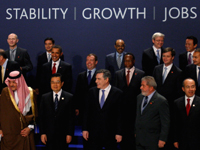Registration
You will receive an email confirming your registration.
IMGXYZ1277IMGZYXOver the past decade, multilateralism has stuttered into gridlock as nations tried unsuccessfully to tackle global problems in areas ranging from trade to climate change. The G-20 has emerged as an effective forum for coordinating the international response to the global economic crisis by bringing together a select group of countries that have a large impact on the global economy.
Carnegie's Twenty Roundtable provides senior Washington representatives of the G-20 nations with a forum for discussing key economic and political issues confronting their countries as they deal with the global financial crisis. The inaugural meeting focused on the future of multilateralism.
Efficacy vs. Legitimacy
The success of the G-20 raises questions about the trade-off between efficacy and legitimacy:
- Involving fewer countries may increase the likelihood of generating a workable solution, but a more inclusive process increases its legitimacy.
- If a small number of countries can generate high-impact solutions, then that process may in some ways be seen as even more legitimate than more inclusive negotiations that bear no fruit.
- A lack of legitimacy could undermine efficacy, if it becomes difficult to get those not involved in the decision-making process on-board.
- Once a substantial number of countries chooses to ignore agreed-upon standards, other countries may feel empowered to follow suit whenever the standards do not serve their self-interest.
A Crowded Landscape of International Organizations
Overlapping missions and competition for limited resources among the increasing number of international organizations has generated global inefficiencies:
- Some participants argued that the tasks of the G-20 should be delegated to the relevant existing international organizations, such as the International Monetary Fund (IMF) and the United Nations.
- Existing ineffective international organizations should be eliminated, a task that has thus far remained a low priority for political leaders. However, the relevance of a given institution can unpredictably change, as exemplified by the reemergence of support for the IMF.
Ceding Sovereignty
The greatest fundamental challenge facing international cooperation is the requirement that countries cede some sovereignty to agreed-upon international standards.
- Even when these standards improve the welfare of a country as a whole, they can generate resentment among specific domestic constituencies that end up on the losing side of the agreement.
- Central banks may find it easier to coordinate policy because they are typically more independent – and therefore less responsive to an electorate – than elected officials, who often face pressure not to commit to internationally-coordinated fiscal and trade policies.
- The U.S. political structure, which features a uniquely strong legislature, may explain why the nation is particularly responsive to local politics.
